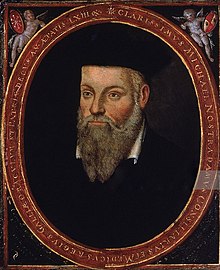
Back Nostradamus Afrikaans نوستراداموس Arabic نوستراداموس ARZ Nostradamus AST Nostradamus Azerbaijani نوستراداموس AZB Нострадамус Bashkir Nostradamus BCL Настрадамус Byelorussian Настрадамус BE-X-OLD
Michel de Nostredame | |
|---|---|
 Portrait by his son Cesar, c. 1614, nearly fifty years after his death | |
| Born | 14 or 21 December 1503 |
| Died | 1 or 2 July 1566 (aged 62) Salon-de-Provence, Provence, Kingdom of France |
| Occupations |
|
| Known for | Prophecy, treating plague |
| Notable work | Les Prophéties |
| Signature | |
| Part of a series on the |
| Paranormal |
|---|
Michel de Nostredame (December 1503 – July 1566[1]), usually Latinised as Nostradamus,[a] was a French astrologer, apothecary, physician, and reputed seer, who is best known for his book Les Prophéties (published in 1555), a collection of 942[b] poetic quatrains allegedly predicting future events.
Nostradamus's father's family had originally been Jewish, but had converted to Catholic Christianity a generation before Nostradamus was born. He studied at the University of Avignon, but was forced to leave after just over a year when the university closed due to an outbreak of the plague. He worked as an apothecary for several years before entering the University of Montpellier, hoping to earn a doctorate, but was almost immediately expelled after his work as an apothecary (a manual trade forbidden by university statutes) was discovered. He first married in 1531, but his wife and two children died in 1534 during another plague outbreak. He worked against the plague alongside other doctors before remarrying to Anne Ponsarde, with whom he had six children. He wrote an almanac for 1550 and, as a result of its success, continued writing them for future years as he began working as an astrologer for various wealthy patrons. Catherine de' Medici became one of his foremost supporters. His Les Prophéties, published in 1555, relied heavily on historical and literary precedent, and initially received mixed reception. He suffered from severe gout toward the end of his life, which eventually developed into edema. He died on 1 or 2 July 1566. Many popular authors have retold apocryphal legends about his life.
In the years since the publication of his Les Prophéties, Nostradamus has attracted many supporters, who, along with some of the popular press, credit him with having accurately predicted many major world events.[7][8] Academic sources reject the notion that Nostradamus had any genuine supernatural prophetic abilities and maintain that the associations made between world events and Nostradamus's quatrains are the result of (sometimes deliberate) misinterpretations or mistranslations.[9] These academics also argue that Nostradamus's predictions are characteristically vague, meaning they could be applied to virtually anything, and are useless for determining whether their author had any real prophetic powers.
- ^ "Happy birthday, Nostradamus: He knew we'd say that". Chicago Tribune. 9 January 2004. Archived from the original on 26 March 2023. Retrieved 26 March 2023.
- ^ Merriam-Webster
- ^ Collins English Dictionary: "Nostradamus" Archived 8 July 2015 at the Wayback Machine.
- ^ Oxford English Dictionary.
- ^ Random House Webster's Unabridged Dictionary: "Nostradamus" Archived 5 March 2016 at the Wayback Machine.
- ^ Brind'Amour 1993, pp. 14, 435.
- ^ Lemesurier 2010.
- ^ Benazra 1990.
- ^ Lemesurier 2003, pp. 150–152.
Cite error: There are <ref group=lower-alpha> tags or {{efn}} templates on this page, but the references will not show without a {{reflist|group=lower-alpha}} template or {{notelist}} template (see the help page).